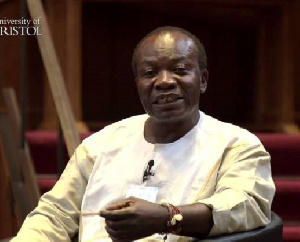- Home - News
- Polls
- Year In Review
- News Archive
- Crime & Punishment
- Politics
- Regional
- Editorial
- Health
- Ghanaians Abroad
- Tabloid
- Africa
- Religion
- Election 2020
- Coronavirus
- Photo Archives
- News Headlines
- Press Release
General News of Saturday, 24 June 2023
Source: GNA
Let’s partner for restitution of African artifacts from Europe - Prof Gavua
Prof. Kodzo Gavua, Associate Professor, Department of Archaeology and Heritage Studies, University of Ghana, has called for partnership among museums in the sub-region and in Europe towards retrieving African artifacts.
He said partnerships were necessary because many of the artifacts and royal regalia that were taken by the colonial masters were taken at the time when African countries did not have the present-day nation-state.
“We have a shared responsibility in this process, so the partnership here must be based on mutual trust and respect, it should not be a matter of collaboration but partnership where we all plan and execute together.”
Prof. Gavua made this call at the conference on restitution, museums, and cultural policies in West Africa, organised by the Merian Institute of Advanced Studies in Africa, in Accra.
He said restitution entailed the return of identifiable objects of cultural materials, human and wildlife artifacts, and other items, which Europeans exported during their colonial stay in Africa and other parts of the world and had kept ever since.
Prof. Gavua said it was a complex process that went beyond the return and receipt of the exploration materials to include efforts to ensure the survival of materials when they were returned and to categorise the repair of damages that the exploitation might have caused.
He said the restitution process was not an event but a process that involved a lot of negotiations between various stakeholders at the national level, activists, civil society organisations, stakeholders, and communities from where the items were taking from.
“At the community level, it should not only be about the chiefs, but the rest of the people and the priests, who represent the local spirituality, because some of the items are not just work of art but are spiritual entities that must be regarded as such.”
Prof. Gavua said some processes of restitution had begun and would go beyond the discourse among scholars to engaging the public, assessing their understanding of the value of those objects that were incarcerated in Europe and the essence of returning them back to Ghana.
Daniel Krull, German Ambassador to Ghana, said restitution was a highly political, social, and relevant topic and that it was important to open avenues that reflected the complexity of the problems evolved, saying “Complexity should not prevent us from taking action in this regard”.
He appealed to government to set up a focal point for discussions on issues related to restitution, adding that the outcome of the conference would be an important step to guide the way to the speedy restitution of objects from German museums to Ghana.
“We hope the outcome of the conference will help to speed up the process and provide some guidelines as to when the restitution of the artifacts to Ghana and Africa at large can be done.”
Prof. Wazi Apoa, Dean of the School of Arts, said somewhere in 2015, the then Chief of Kpando, the late Togbe Dagadu Anku III, sent a request to the then-German Ambassador for the return of objects and royal regalia that were taken from Kpando somewhere in 1913.
He said after he passed, the new Chief had also sent a similar request.
“In order to fast track the process, the Chief again sent a request through the chairman of the focal team for restitution and reparations, Prof. Gavua, to expedite action on the return of the objects to the people of Kpando.”
Entertainment










